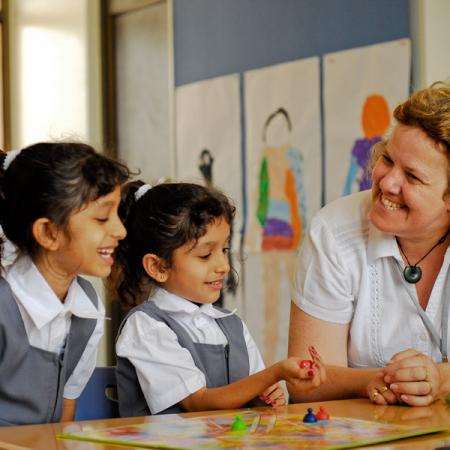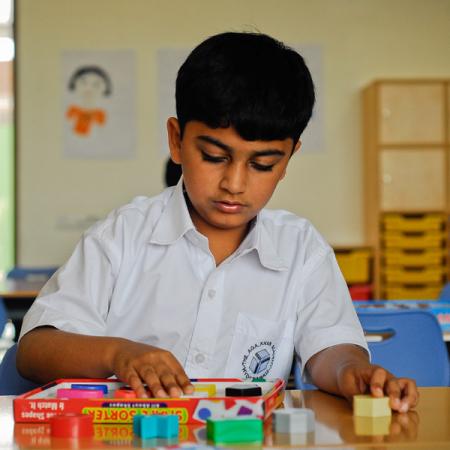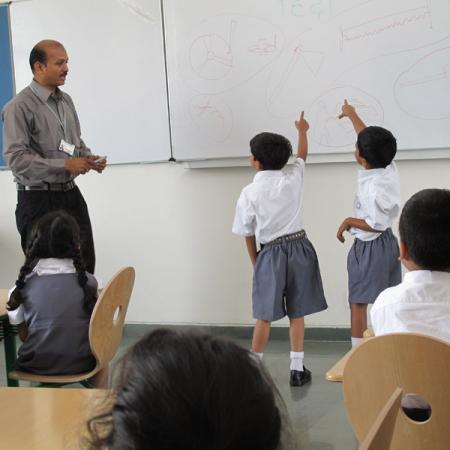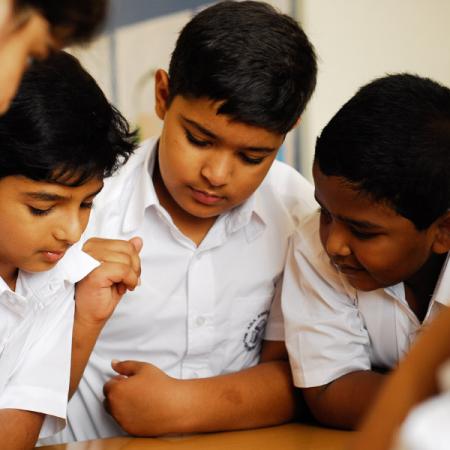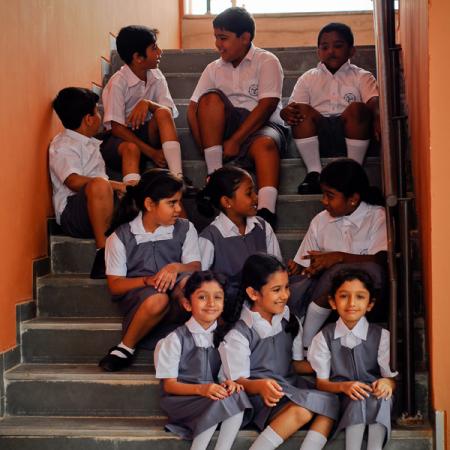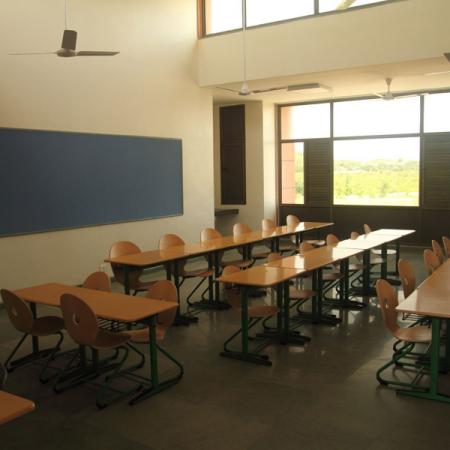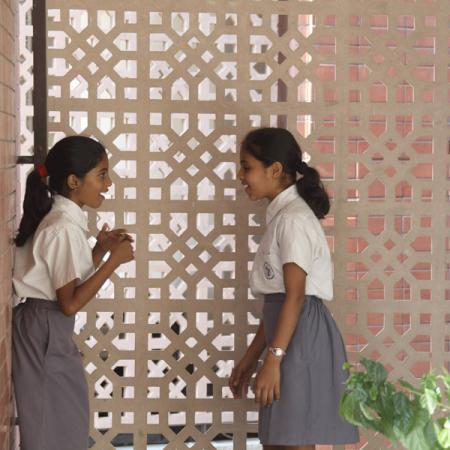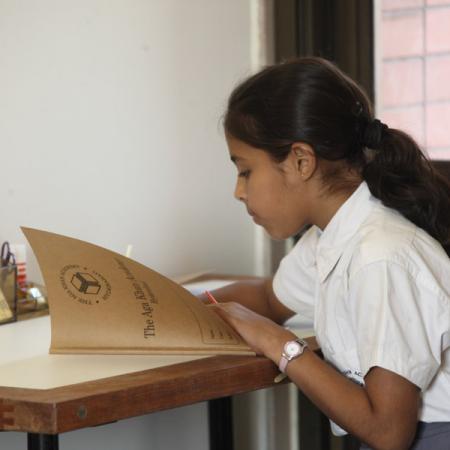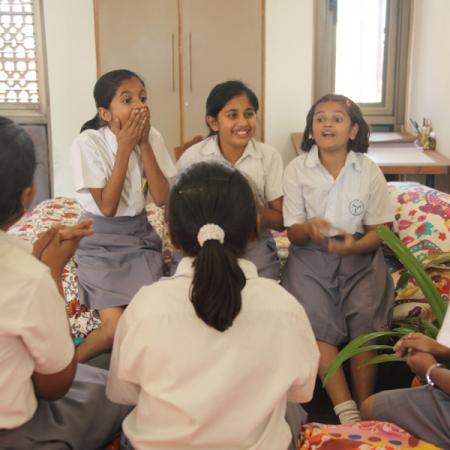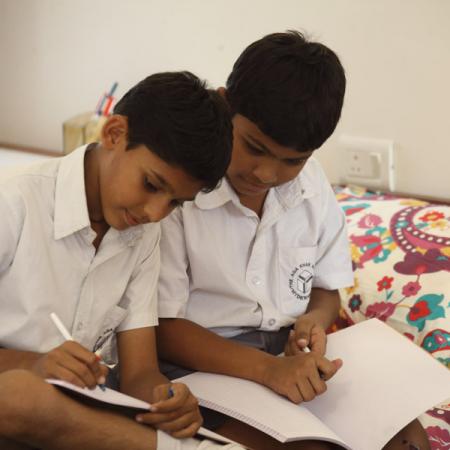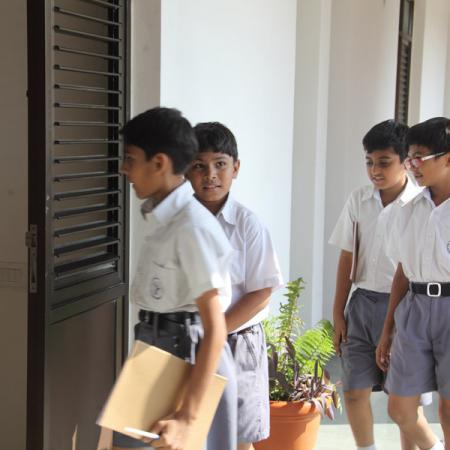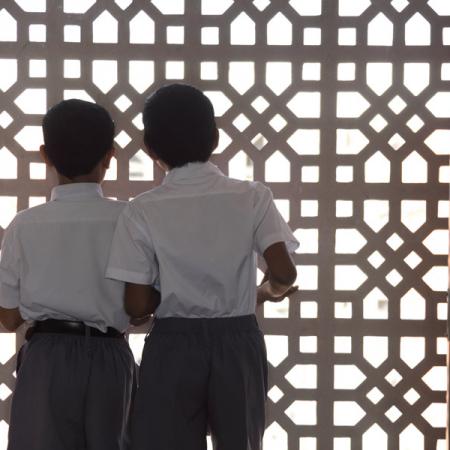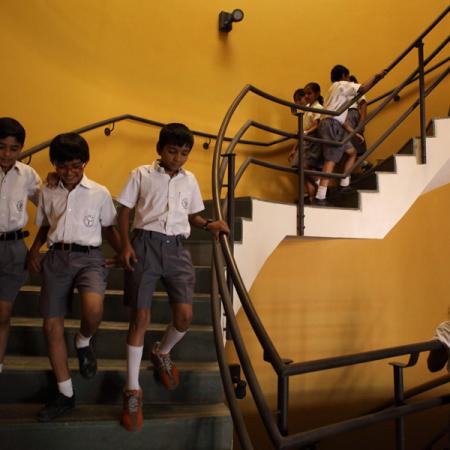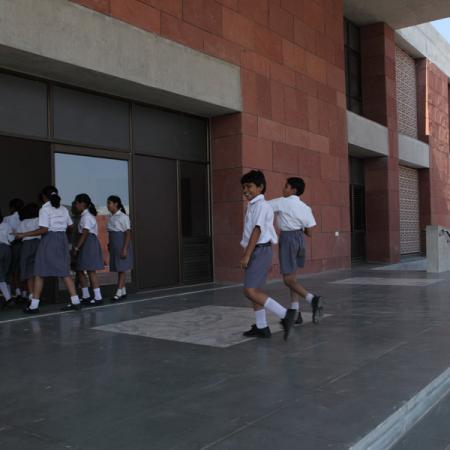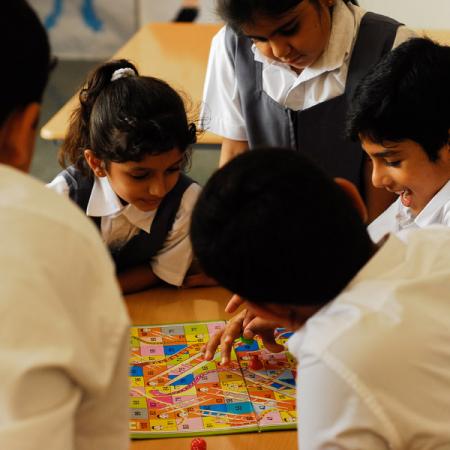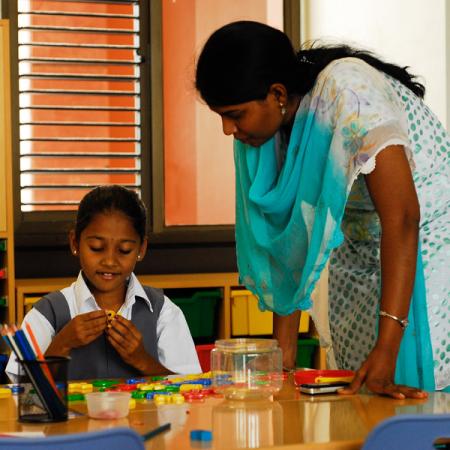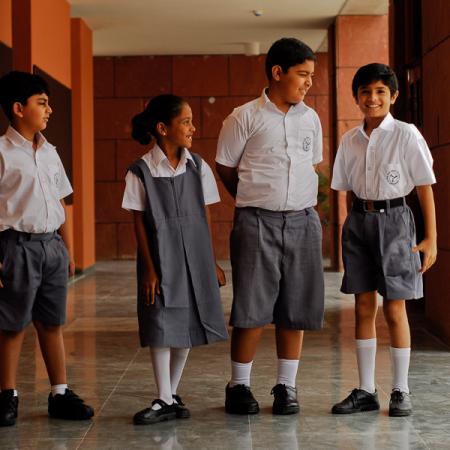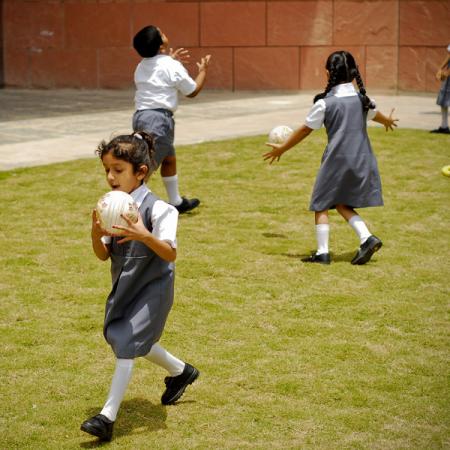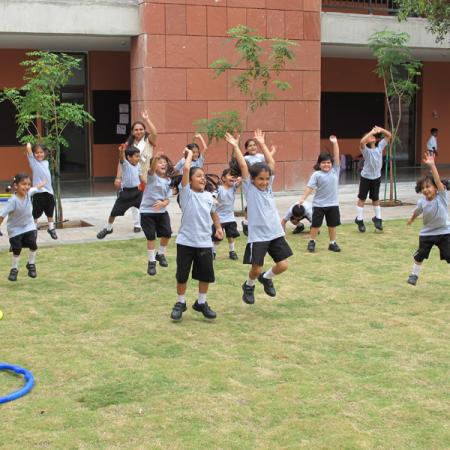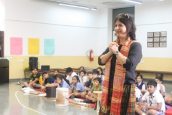International Baccalaureate - Primary Years Programme
International Baccalaureate - Primary Years Programme
Sujana Veeramachaneni: Teacher, Assistant Coordinator, Dorm Parent, Mentor
At the Aga Khan Academy Hyderabad, Sujana Veeramachaneni holds more than her official titles of biology teacher and Assistant Coordinator for the Diploma Programme (DP), science teacher for the Middle Years Programme, and dorm parent. Sujana also ensures her students see her as a friend, mentor and pillar of support.
“They should always feel that I’m there for them, no matter the situation, or condition or time of day,” she insists. “Sometimes I get midnight phone calls! They don’t hesitate to approach me.”
Since the majority of DP students live on campus, “My job doesn’t end in the school,” she explains. “We see them as students, and the dorm is like a home for them – so it’s like seeing them at school and at home – same child, different behaviour. Sometimes it’s difficult to draw a line, because we see them here as well as in the school – so that emotional role is with us, also."
“Of course, I have to draw the line – otherwise maintaining discipline is quite difficult – but at the same time, that line is flexible. It’s not firm – but of course, there is a thin line.”
From her side, Sujana believes that she and other staff can learn from the students’ impressive ability to control their emotions at school. “These are all teenagers,” she reflects. “We see them here, inside and outside. Sometimes, even we lose control – but the students don’t have tantrums in front of their teachers. That’s what I learn from them – how to control our emotions.”
Sujana remembers what she went through at her students’ ages, and understands the pressures they face, especially those approaching graduation from the Diploma Programme, who face multiple deadlines, university applications, and academic and personal challenges. “I always put myself in their shoes,” she emphasises, and shares with her students her anecdotes on how she dealt with stress as a student.
At the same time, she acknowledges times have changed. “This generation is under more pressure – we were not exposed to so many kinds of media or diversions. They are dealing with many things at the same time – compared to them, when we were students, we had less complexity in our lives.”
The demanding IB curriculum motivates Sujana as a teacher, even though her switch to a career in teaching was first supposed to be temporary. Sujana holds an MSc in life sciences, with a specialisation in endocrinology, and a PhD in plant physiology. Her research focused on the physio-biochemical parameters of the post-harvest life of roses, after which she worked in post-harvest floriculture in Bangalore. In 2002 she relocated to Hyderabad and started working as a teacher in an international school.
She was drawn to the demanding and challenging nature of the International Baccalaureate curriculum and in 2013 joined the Aga Khan Academy as a biology teacher. Her career at the Academy has been a learning trajectory: “I’m definitely enjoying the professional development here.” She highlights the different positions she has held over the years, as well as gaining confidence over the years in teaching, helping, and guiding Special Education Needs (SEN) students, and the training, support and resources she has received from the SEN specialist at the Academy.
She also appreciates that the Academy itself is always developing – every year different projects, opportunities and ideas are introduced or planned for the future, and she praises the community service that the school ensures students experience: “It is inculcated in the students – the mission itself is very good and strong.”
The Academy is also always learning from its students; if, for example, some students stand out at drawing or music, the staff will learn from those strengths, and apply what they learn with students in the next batch. The curriculum is reviewed every year, and coordinators and deans take sessions every year to improve and upgrade their skills.
Academically, Sujana especially appreciates the opportunities students have to explore their own interests and to learn independently – “That is the beauty of the Extended Essay.”
“It’s very dynamic,” she explains, and she describes the Extended Essay as a “piece of research work, where the student will find their passion” and submit an essay akin to a mini-thesis.
Because “the curriculum has the scope to identify the strength of the student in different ways” and “the student will design their own labs,” independence and the opportunity to follow one’s own interests is important: “Every student’s choice is different,” she says.
As their teacher, Sujana enjoys the intricacies of guiding the students individually and tailoring her teaching style to their interests and strengths. This year, she is supervising six students, whose self-selected Extended Essay projects explore a range of topics including hydroponics, the greenhouse effect and carbon dioxide concentrations, mushroom cultivation, seed germination, and the effect of music on the growth of plants.
Sujana enjoys being able to show her dynamic, expressive side at the Academy and the freedom of teaching styles and resources that is not always available at other schools. But she finds even more satisfaction in mentoring than in teaching, and it is most rewarding when her students achieve their goals – obtain university admission, get their diploma, or overcome an obstacle when they thought they couldn’t cope, but were “able to achieve something with our guidance.”
She emphasises the need to be adaptable and compassionate towards her students, both for academic and emotional support. “You have to tailor yourself to the needs of the students because some students, you really have to encourage them, motivate them, and some students – at times you have to be firm, strict,” she explains. “I change myself, as per their needs.”
When asked what she envisions for her students’ futures, Sujana replies that she wants them to identify their passions and to continue doing what they like. “I want them always to be confident.
By Natasha Pirani
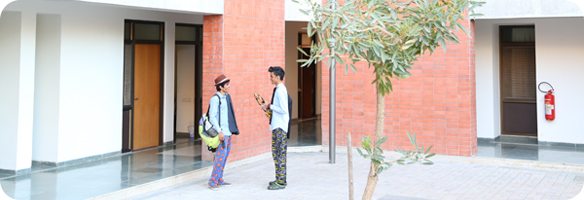
Living on Campus
Residential life at the Academy complements and extends the academic experience. Our residential programme includes a broad selection of activities and leadership opportunities to enhance students’ learning and growth.
The Academy’s residences include facilities to accommodate both students and teachers. Our residences house boarding students requiring accommodation as well as those participating in international exchanges between the Aga Khan Academy Hyderabad and other Academies and schools.
Teachers' quarters on campus house both resident and visiting faculty.
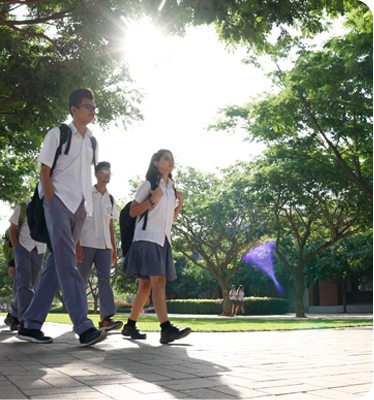 Learning beyond the classroom
Learning beyond the classroom
Our residential programme is about the learning and growth that comes through constant interaction with a diverse and talented group of teachers and peers.
Mealtimes and other gatherings provide our residential students with opportunities for informal interaction as well as for discussions, meetings, language tables and study groups.
The focus of the residential experience is on students’ intellectual, social, spiritual and physical growth in a structured and ethical environment. Many of the least tangible but most important elements of an education – the development of practical leadership skills, the capacity to make ethical judgments, the ability to navigate through complex cultural settings – are formed outside the classroom.
The safe and secure environment of the Academy’s boarding facilities gives students of all backgrounds the opportunity to thrive emotionally, intellectually and physically.
Photo gallery
Annual Academy Review Meeting - Hyderabad, 26-27 April
Welcome to the Directors of the Aga Khan Academies global network to Hyderabad this week for our next ARM.
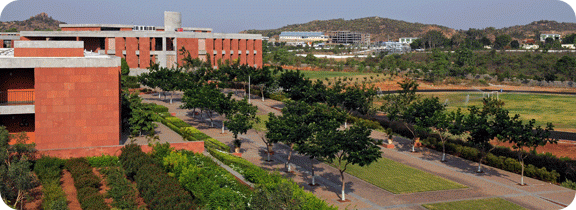
About the Academy
The Aga Khan Academy Hyderabad is an International Baccalaureate (IB) World School and is the second in the network of Aga Khan Academies established by His Highness the Aga Khan.
The Academy features state-of-the-art facilities, a multicultural student body, and an experienced team of educators and staff. We provide students with education of the highest standard in order to prepare them for lives characterised by leadership and service.
Admission to the Academy is competitive and based on student merit, regardless of a family’s ability to pay. We consider all eligible students regardless of socio-economic status.
Mission statement
The following is the mission statement of the Aga Khan Academy Hyderabad:
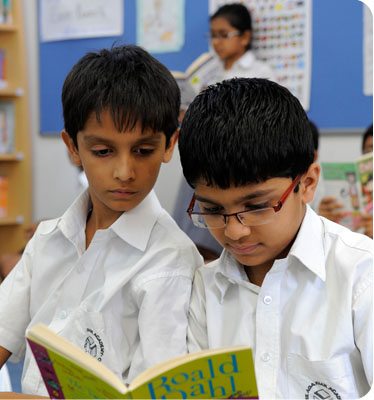 "The Academy will identify and nurture exceptional young people from any background with the potential to become effective, ethical leaders. It will be a joyful community of lifelong, fearless learners who are culturally-rooted and internationally-minded. Academy graduates will be reflective, compassionate, adventurous and creative citizens empowered as stewards to make a positive contribution in a changing world."
"The Academy will identify and nurture exceptional young people from any background with the potential to become effective, ethical leaders. It will be a joyful community of lifelong, fearless learners who are culturally-rooted and internationally-minded. Academy graduates will be reflective, compassionate, adventurous and creative citizens empowered as stewards to make a positive contribution in a changing world."
A culture of excellence
As with all the Aga Khan Academies, we are committed to excellence in all aspects of education. This commitment includes the academic curriculum as well as the campus where students live and learn.
Our campus is architect designed and purpose built. It features state-of-the-art classrooms and resource areas, and extensive sports facilities. These outstanding facilities provide an inspiring environment for both students and staff.
At the Academy, we strive to create a balance between academic demands, sports, cultural activities, and community life. We challenge our students to be intellectually inquisitive and socially conscious. We also encourage them to respect and appreciate other people’s cultures, social structures, values and beliefs.
A rigorous academic programme
Our academic programme has been developed through the implementation of the widely-recognised International Baccalaureate. The programme is designed to challenge students of all backgrounds.
Our aims for our students include:
- promoting academic excellence
- enhancing analytical and study skills
- building leadership skills
- fostering an ethical outlook and sense of civic responsibility
- developing an understanding of global issues
- encouraging creativity.
Experienced local and international teachers lead our programmes. Faculty members are up-to-date with the best educational practices. They are committed both to their students’ learning and to their own continuing professional development.
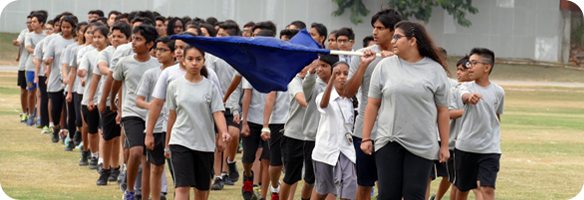
Diploma Programme
The Aga Khan Academy Hyderabad has received authorisation as an International Baccalaureate (IB) World School offering the IB Diploma Programme (DP). The programme is offered to students (aged 16–19) in the final two years of school.
The Diploma Programme is a demanding, pre-university-level course of studies. It is internationally recognised by over 2,000 universities worldwide.
The DP has a reputation for rigorous assessment of student achievement. Each student’s performance and levels of knowledge are examined internally by teachers according to set criteria. They are also assessed externally by independent examiners according to global standards applied to all IB schools.
Our students study all the subjects covered in a traditional, broad curriculum, including languages, social sciences, experimental sciences, mathematics and the arts. The DP also takes the curriculum a step further through three unique programmes:
- theory of knowledge
- creativity, activity, service
- extended essay.
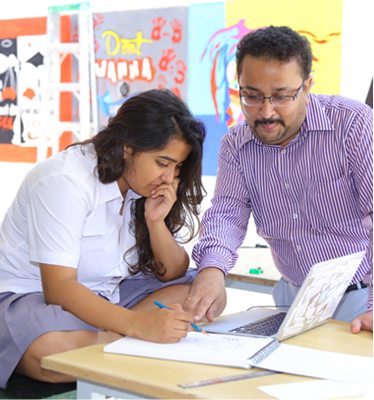 Theory of knowledge
Theory of knowledge
Theory of knowledge (TOK) is an interdisciplinary requirement unique to the International Baccalaureate Diploma Programme. It encourages students to reflect on the knowledge they gain both inside and outside the classroom.
One hundred hours of classroom time are dedicated to the TOK programme. We challenge our students to question the nature of knowledge across disciplines, to recognise biases and to analyse evidence using rational thought and argument. By making our students consider and appreciate different perspectives, TOK contributes towards a pluralistic outlook.
Creativity, activity, service
Creativity, activity, service (CAS) is an important component of the IB curriculum and is required for every DP student at the Academy. Our students participate actively in a variety of creative endeavours, physical activities and community service projects. They develop self-confidence, teamwork and leadership skills, and a sense of civil responsibility.
Students take part in sustainable projects that have real and lasting effects on the greater Hyderabad community. They develop strength of character and an understanding of their ability to bring about change.
The CAS programme is valued for its power to transform the lives not only of students but also the people they work with. It serves as a platform for interpersonal exchange, personal growth and greater understanding of the issues we face as a global community.
Extended essay
The extended essay requires students to pick a subject of their choice and research and develop it into a 4,000-word essay. Students may choose to investigate a subject from one of their higher-level courses more deeply. Or they can broaden their academic experience by researching a subject in a field they are not currently studying.
Through the extended essay, we introduce students to the kind of independent research and writing skills expected at the university level.
For further information on the IB Diploma Programme at the Academy, please see the admission requirements or contact us.
Swim coach, K. Surendra, wins 4 golds
Hyderabad swim coach wins at Telangana Swim Masters Championships, moves on to nationals in October 2018.
Academy hosts Metro MUN - 8th-10th December 2018
Over 200 students from more than 10 Hyderabad schools will participate in debate sessions at the Academy.
